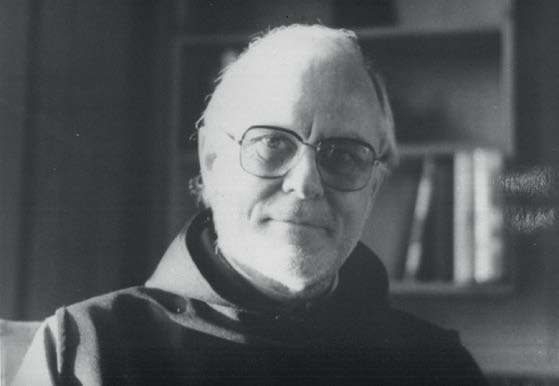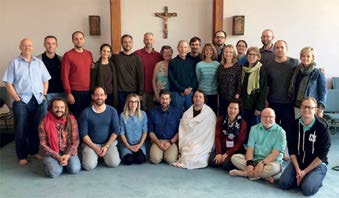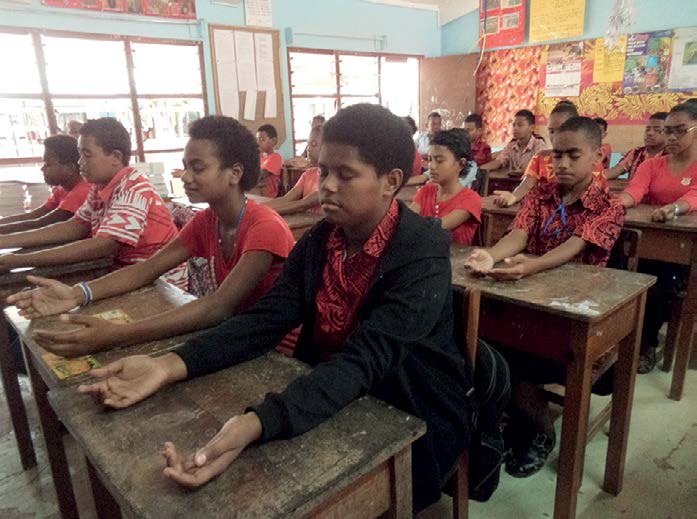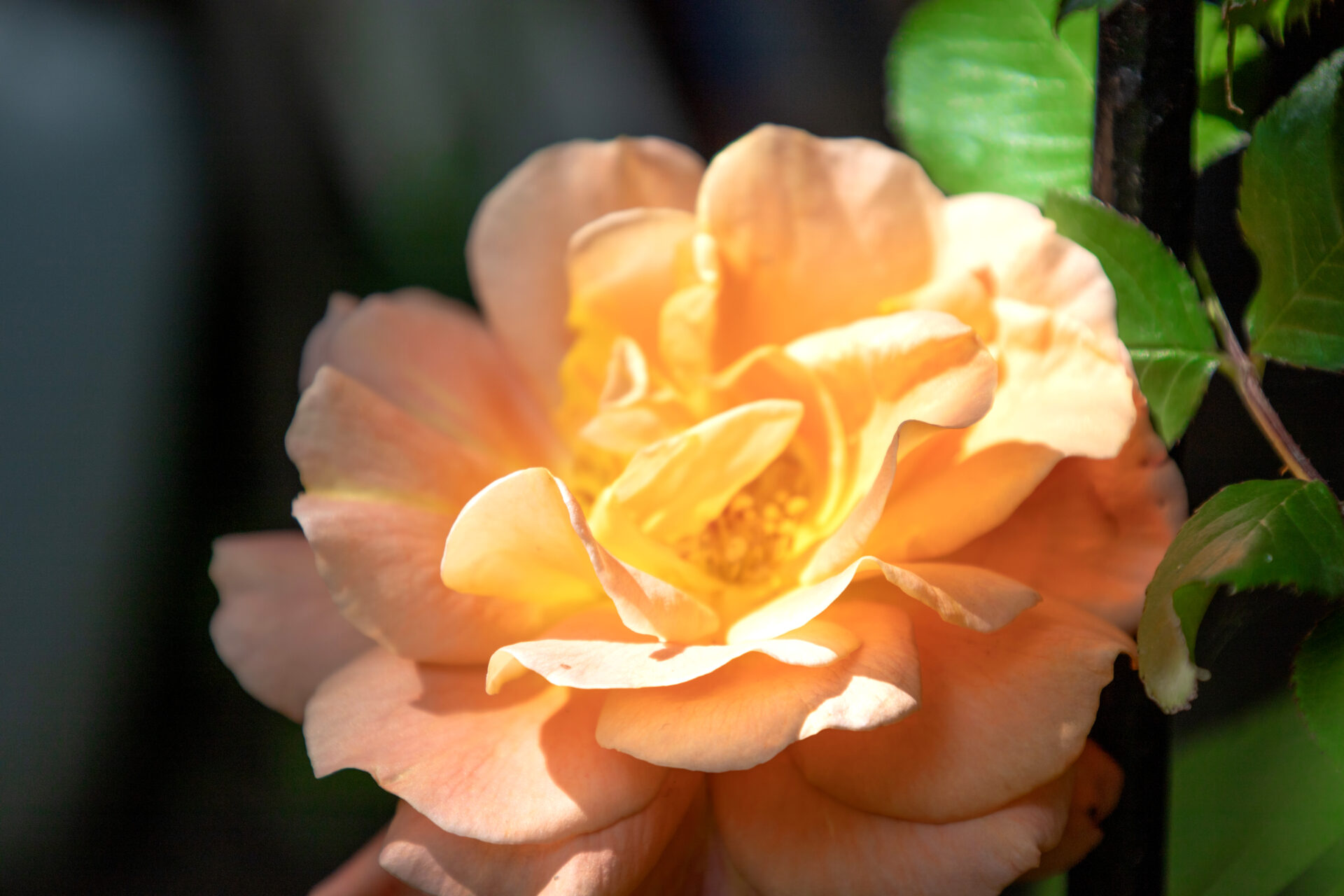Dearest Friends,
The great Benedictine scholar Jean Leclercq, who was also a great traveller, once wrote an excellent article on Stability for Monastic Studies. Maybe to deflect critics who might accuse him of inconsistency – and they are always close at hand – he used to say ‘I am a very bad monk. But I am very much a monk.’ Humility (the genuine kind) and humour (in moderation) are great defences and strengths. They enable us to live with the self-contradictions we all carry with us as part of the baggage of life, not to be too dependent on others’ opinion of us and not to take ourselves too seriously. All these are essential attributes for the spiritual life. Baggage there will always be. However much we may reduce it, there will always be some we have to drag on and off the various vehicles that carry us from one phase of life to the next.
At the cusp of a new year we try to shed some of the baggage. We look backwards and forwards. Janus (after whom January is named) was the Roman god of beginnings and transitions and of doors, gates and time. He was two faced, looking in both directions at once. There are moments when we too see like this. For me this time of the year recalls the loss of John Main as well as the beginning of what became the World Community – something at the time he saw coming more clearly than I could.
Jean Leclercq wrote to me soon after John Main died (December 30th 1982) to say that he had heard the news: “So Fr John has leapt into the light. I envy him. I pity you.” We are born into contradictions and we live with paradoxes. When someone tells me they have a relationship that has no weaknesses, doubts or frictions, I wonder. I sense an attempt to persuade themselves of something they may not really believe themselves. When we are in any relationship, but especially one in which we have invested our identity and hope for the future, we are continuously edged towards new, uncertain levels of self-knowledge. So are those we are in the relationship with.
Even in the deepest relationships, where profound communion has grown, we remain individuals with our baggage that we have to carry ourselves. Sometimes we prefer stasis in a relationship – pressing the pause button when we are in a good phase – but, whether we like it or not, we are always changing and helping each other to grow. However settled and domesticated we become, something will always happens to start a new adventure. One person may relish the challenge while the other resists it. Rarely do we grow at the same rate, in the same ways, and never always in sync.
“We are born into contradictions and we live with paradoxes”
In Bonnevaux the other day I was looking at some garlic in the upper meadow planted recently by Thomas, our enthusiastic permaculture gardener who is cultivating our first fields. He was excitedly showing me the first green shoot to appear. But he couldn’t tell me why that one had sprung up first or how far behind the others would be or when the last slow one would eventually appear. We grow together, obedient to the same laws but differently.
To be in relationship with someone whose self-knowledge is more advanced than your own presents challenges but also wonderful opportunities. Perhaps marriage isn’t the best receptacle for that formula of relationship but it is certainly at the heart of the guru-disciple relationship. Many marriages struggle for a long time to achieve a balance of personal strengths and integration of roles. The imbalance of power in a marriage is often a cause of jokes – the over-submissive or over-dominant spouse – but also of suffering. If there is not a conscious process in which balance is being achieved – even if it is hidden deep in the secrets of the relationship – the relationship will struggle to be the vehicle of self-knowledge that all relationships should be.
At both the deepest spiritual level and the highest cosmic level we can see this happening in our relationship with the Mind of Christ. Jesus claimed to ‘know where I have come from and where I am going’. That he ‘knew the Father’ meant that he knew himself. And thus he knows us and the whole great plan of which we and the rest of humanity are part. No one, Christian or not, would deny that he (and all that Jesus of Nazareth began) has changed humanity’s awareness of itself. The disciple of Jesus, even at an early stage of that journey, experiences that change at an intimate, interior and integrated level. Encountering the self-knowledge of Jesus (which is the Holy Spirit he said would come) is to feel an explosive boost to our own process of knowing and understanding ourselves.
I was saying mass on Bere Island recently for a major feast and asked the two altar servers what they knew about the feast. Neither of them had any idea. The habits of religious practice have diverged from the basic narratives of Christian faith as ways of meaning. Without these stories that grow in meaning as faith deepens the external practice soon becomes empty and meaningless. Do we need a massive PR campaign and advertising blitz to reignite the transmission of the faith as some church leaders desperately think? Or do those who are neither ambivalent nor embarrassed by their Christian identity need to speak less, to deepen their silence. They then allow the Spirit to turn them, not into salesmen of the gospel but into the gospel itself. In this tradition the disciple has always been seen primarily not as a promoter but as an alter Christus, another Christ.
I had my own time as an altar server. I even continued to go to church until, as I got older, I found that the Church and its promoters just didn’t seem to connect with the questions and issues I was dealing with. I didn’t get angry, just drifted away. In John Main I came to see that I was seeing Christ. After a while I felt that Christ was patiently, steadily, lovingly, gazing at me in a way I had never expected possible, without judgement or conditionality. Over the years and through his dying I saw Fr John become another Christ even as he became more uniquely and irreplaceably himself. There are no words to describe this union of identity because in such a union words are increasingly redundant until eventually they dissolve into the absolute silence of a presence that is love.
I found this (I wasn’t looking for it) within monastic life. The outward form of the life was not very appealing and at times even embarrassing but the emerging encounter was far stronger than that. I realised that the mystery of this relationship needed stability, fidelity and endurance that serious relationship requires in any form of life.
In married life there is a danger of domesticating the stability into routines so that the relationship gets buried under daily busyness and distraction. In the life of any contemplative community there is a similar tendency to equate domesticity with stability, to see the chant of the rhythm of prayer as a lullaby or to make the cloister an escape rather than a laboratory.

I like that compound word laboratory. It is made up of labor – work, like planting garlic or welcoming guests; and oratio – prayer, like singing psalms or saying the mantra. It captures the dynamic, not just of monastic but of all life. I have come to feel that if the monastic life achieves radical simplicity – in any authentic form – it harmonises with all other authentic kinds of life. This is our vision and aspiration in Bonnevaux – to harmonise and reconnect different forms of modern life through the radical stability of meditation and a contemplative community. This involves solitude but it is also an endlessly renewed encounter with others. All the members of a community, like members of a family, live together at differing stages of their journey. They connect to each other and heal and support each other through their weaknesses and strengths. Both their desire for and their fear of personal change bring them together. This is achieved if the community is built not on the principle of narcissism, seeking my own fulfilment, but on the principle of service, caring for your fulfilment. Service not self-seeking. A ‘school of the Lord’s service’ is how St Benedict describes it. This is today, as always has been, about as counter-cultural as you can get.
The glamour of novelty, the illusions spun by false expectations, wear off quickly when the ‘school’ starts to bring you down to earth. It can then teach you how to learn and how to serve. Self-deception and denial are soon exposed. How do we react to this? Either with blame, anger and self-withdrawal or with humility, humour and deepening commitment. Many people are attracted to community (or marriage) for authentic reasons but they also fear the challenges and demands. They want to escape their sense of disconnection and loneliness. But they also resist reality when it appears too starkly. Just as many today postpone the commitment to become spouses while remaining ‘partners’, others want to come into community but with reservations and conditions.
Of course, at first that’s sensible and necessary. It takes time to be clear about any serious commitment and to become familiar with the path of self-knowledge. A time in community may be right for a period to teach you how to make a deeper kind of commitment in another form of life. (In some Asian monastic cultures a short period as a monk is seen as preparing a man to be a better husband). By gently growing in a spirit of service we learn what commitment means. We also learn how to commit and what to. We discover that the experience of relationship, of community, of communion that we thirst for requires that we learn to serve.
John Main invites us to a serious commitment to meditation practice but he also recognised it takes time – differently for each person – to arrive at the discipline of the twice-daily sessions integrated into ordinary life. His own commitment was not only to the practice but to the extraordinary focus of his teaching on practice. He did not speak so much of the benefits – social or personal – although he saw the value of the practice in transforming both. His commitment was to inspire and encourage people to begin and keep on beginning. He once described meditation to cleaning a tarnished bronze table and said how it was small repeated strokes, in one area after another, that would best restore its obscured beauty.
‘Commitment’ is a scary word at the best of times and these are not the best of times. A friendlier word to describe what it means is ‘embodied’. The ‘-mit’ part of the word commit comes from the Latin meaning to send. By commitment we send ourselves. We go out from ourselves, push out from shore into the ocean of faith. To commit means to give oneself to the tangible, the actual, the embraceable and to feel that you truly belong in the arms of the real.
..that which we have heard and we have seen, that which we have perceived with our eyes and we have touched with our hands (Jn1:1)
John Main was a very embodied person. He was also very much a monk and a good monk. But his insight penetrated far beyond that particular form of life. It led him to understand the meaning of relationship itself and how we are capable of it – or not – in modern culture. He saw the painful prison of individualism, isolation and loneliness in which so many feel locked. Since his day digital culture has greatly intensified this problem. For him, though, salvation meant, firstly, to be liberated from that separated sense of self and healed of the experience of division from our self and others. These experiences drive much of the depression and mental illness among the young.
He also knew that the ‘crisis of the self’ has gone so far that traditional ways of communicating the healing message of the gospel merely bounce off this wall of separateness. The good news is that we are not alone and divided. We are embodied and tangible and known. Our true self, embedded in the web of being, is loveable like everyone and everything else. Self-knowledge is to touch the love which is the source of our being, and is being itself.
Through his own struggles and within his monastic tradition John Main saw a way through our modern crisis. It begins by recognising that the core of the crisis and its cure involves the rediscovery of the human spirit. For religious institutions this simple first step can be a huge stumbling block when religion itself has become de-spiritualised. Religious forms, loyalties, identities and beliefs can even become force-fields that deflect the energies of the spirit. Religion has fallen into this sorry, self-contradicting state in other periods of history, as Jesus understood about the religiosity of his own time. In each of these eras where religion became disconnected from people’s spiritual hunger the way forward comes as a rediscovery of the contemplative dimension. This dimension applies to all forms of human life and to each personal consciousness. We may debate about whether Jesus imagined a new religion called ‘Christianity’. But there is no question about the contemplative nature of his spiritual teaching – interiority, silence, equanimity and being in the now. This underpins his social vision of a world finally freed from violence and injustice.
According to John Main nothing is more urgent for us now than to rediscover the spiritual dimension and its energies. He did not say meditation was the only way to do this. He believed that love is the way. But meditation is a work of love that dismantles all that disempowers our capacity to love. For the new meditator love will become visible as the first fruit of their new practice. It may not be what they expected or even thought they needed. It will also reveal that the solitude of their practice connects them to a different kind of experience of relationship, of community. This evolves. As a ‘school of service’ it becomes a place where the hard shell of loneliness cracks open to reveal the true self in the boundless nature of relationship.
Fr John’s theology breathes through the model of relationship expressed in the Christian understanding of the Trinity. Here God is seen as relationship, communion and community. Not an anthropomorphic God. But as the way for human beings to understand themselves. Not God as a philosophical idea to be proven or debated. Or as a magical ego-projection offering false consolation. But God as the love that every human being seeks and that cannot be reduced to biology, neurotransmitters or even to desire.
We seek love, named or not. Therefore, we seek God whether we believe or not. ‘Whoever loves lives in God and God lives in them’. The ego will fail to understand this because it wants to possess what it seeks, if and when it finds it. Whoever truly seeks will find but then, as truly, we will lose, in myriad ways, in each phase of our life. God is the human quest that gives meaning to life whether or not we believe. Religion wants us to ‘believe’. God just wants us to love. Once any goal has been achieved we soon become restless again. We will never be fully satisfied even by finding what we are looking for. After a few cycles, this leads either to cynicism or faith. We either disdain the search or plummet deeper into the whirlpool of reality. We find God and lose God in the same instant. The mystics of all traditions understand this better than the ‘learned and the clever’
For many clever thinkers today all this is an outdated mystique for explaining the human condition. They believe (and it has become a new orthodoxy) that the meaning of life is better described by a combination of psychology, economics, social science and neurology. God is just bad fiction. The spiritual dimension is just a room of mirrors. Consciousness? Well, we don’t know yet how consciousness arises from the electrical activity of the brain but it must be merely a product of things not the origin of everything. This new materialism has become a dogma and generates its own prejudices just as religion does. It is a two dimensional humanism with length and breadth but no depth. It often ridicules and denies the spiritual, depth dimension, rejecting it after identifying it with the worst aspects of religion. Culturally, this is a receipt for deceit. Psychologically, it burns the bridges that connect us to all wisdom traditions. Spiritually, it strands us on a floating iceberg where we just imagine how we can bio-engineer ourselves to become the God we no longer think is real.
So when John Main said thirty years ago that the most important of modern tasks is to recover the spiritual dimension, has this become any less true or urgent? Maybe because of his background in diplomacy, law and education he was eminently practical. Maybe true contemplatives are the least abstract and the most embodied of contemporaries. He believed that recovering the spiritual must begin by learning to know and love ourselves. If we cannot get back into relationship with ourselves as we are how can we relate to anything or anyone else realistically?

However resistant we may be to that process of self-discovery, there is no way of sidestepping it. I was once participating in a conference with scientists and religious leaders. One scientist impressed me intellectually more than the religious leaders but he was irrationally condemnatory of religion – the cause of illusion, wars, intolerance etc. I asked him if, on the same premise, he thought we could ban science because the scientific method was applied in the concentration camps and the best scientific minds of the time produced the atomic bomb. In the meditation period he sat in front of me ostentatiously and loudly leafing through a booklet. Later someone said to him ‘meditation is so important because it helps me see what’s going inside me’ With wonderful honesty the scientist replied ‘that’s why I don’t meditate. I don’t want to know what’s going inside me at all.’
It’s not only some scientists but many religious and other kinds of people who find the first step so difficult. We all resist a self-knowledge that is deeper than that found at the conceptual, self-reflective level. But if we don’t go there we cannot discover the spiritual dimension. Just how resistant we can be is evident when we say we want to meditate and then make excuses for not meditating.
What we actually believe at this first step is not so important. But we must have enough faith in ourselves to take it. The beauty is in discovering that it is always a first step. Soon, if we allow sufficient space and time for the experience of love to emerge, we see how self-knowledge ripples outwards affecting all our relationships and propelling us towards the ungraspable horizon of the unknown God.
This year’s John Main Seminar (in Vancouver, Canada) is on the theme of ‘Contemplative Christianity’ and is led by a masterly young theologian, Sarah Bachelard. She leads a contemplative parish community in Australia and participates in the Contemplative Exchange group that emerged from our Snowmass meeting last year. We are living in times that are often dark and disturbing. To hear the spiritual leaders of the future looking, from a contemplative perspective, at what we are going through helps restore hope and revive faith. These qualities produce love and it is love, in unexpected manifestations, that will illumine our decisions. In July there will be a retreat for young adult meditators at Bonnevaux. They too see things differently. Maybe together, meditators from different generations meeting in the same experience of community will be able to see the blessed simplicity of the next step, the big leap of consciousness, that humanity must take.








